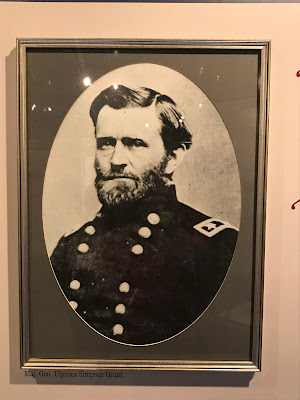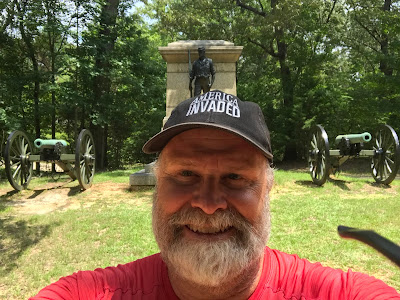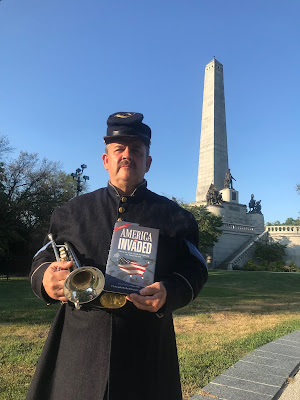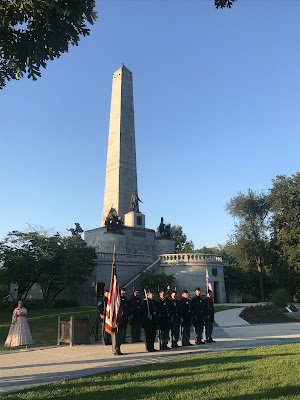 |
| Ulysses S. Grant & his wife Julia Grant Home Galena, IL |
On my recent visit to Illinois I had a chance to see Ulysses S, Grant's hometown of Galena Illinois. Galena is a charming town. Grant was born in Ohio rather than Illinois, but he spent many years in Galena working as a shop clerk before the US Civil War. After the war the citizens of Galena purchased a home for Grant to honor his service. Visitors to Galena can find his well preserved home curated by the National Park Service...https://www.granthome.com/grant_home.htm.
I wrote earlier about Ron Chernow's excellent new biography of Grant and even recommended it for President Trump's nightstand! See...https://americanconservativeinlondon.blogspot.com/2018/02/why-trump-should-read-chernows-grant.html. This book was an admirable reappraisal of
But there was a key to Grant's character that even Chernow seems to have missed -- Grant was a Fighting Celt in the tradition of William Wallace and Brian Boru. The Celtic aspects of his nature help explain his impressive horsemanship, his determination on the battlefield and even his drinking.
In our forthcoming book 101 Fighting Celts: From Boudicca to MacArthur we (Kelly and Laycock) examine Grant's Celtic heritage and his unquestioned martial skill.
"Who is buried in Grant’s tomb? An Ohioan. A West Point graduate. A veteran of the Mexican-American War. The foremost commander of the US Civil War. The 18th President of the United States. All of these…but also a warrior of partly Celtic ancestry.
Ulysses S. Grant was born in Ohio in 1822 in Point Pleasant Ohio. Fighting was in his blood. His great grandfather served in the Seven Years War and his grandfather Noah fought at the battle of Bunker Hill in the American Revolution.
Grant had double-barreled Celtic ancestry. Ulysses S. Grant had an Irish grandmother, Rachel Kelley, who married Noah in 1792. His great-grandfather had left Dungannon in County Tyrone in the 1730s. Another ancestor, John Roberts, was born in Wales in 1665 and migrated to Pennsylvania where he died in 1735.
At West Point Grant was a middling student, remarkable mainly for his excellent horsemanship. Like so many Celtic warriors who preceded and followed him, Grant developed a lifelong love of horses.
Lieutenant Grant served with distinction in the Mexican-American War (1846-48) where he fought in many battles rising to the rank of captain. In 1879 he told a journalist “I do not think that there was ever a more wicked war than that waged by the United States on Mexico.” In Grant’s memoirs he described this war as “one of the most unjust ever waged by a stronger against a weaker nation.” Grant would come to believe that the war with Mexico was a “transgression” which, in some sense, was a precursor to the US Civil War.
After the war Grant served with the US Army on the frontier in California. Bored with peacetime service he turned to drink. He resigned from the Army to escape court martial.
In 1860 Grant was working in his father’s leather good store in Galena, Illinois. His life might have been largely ignored by history had it not been for the outbreak of the US Civil War in April of 1861 which followed the attack on Fort Sumter. The great tragedy of America’s bloodiest war was a career opportunity for Grant which he seized avidly.
 |
| Ulysses S. Grant |
Operating in the Western theatre of the war, Brigadier General Grant immediately demonstrated his aggressive approach in 1861 by, without prior authorization, seizing Paducah in the order state of Kentucky. In 1862 he won significant victories in Tennessee. He cooperated with the US Navy in a river campaign that led to the capture of Fort Henry and Fort Donelson in Tennessee.He gained the nickname “Unconditional Surrender Grant” for the uncompromising terms he demanded from Confederate General Buckner at Donnelson.
 |
| Commander K. at Shiloh Battlefield |
On April 6-7, 1862 Grant led Union forces in a two day battle on the banks of the Tennessee River near Pittsburg Landing. The first day of the battle went poorly for the Union with Confederate forces launching a surprise attack. On the night of April 6 General Sherman observed to Grant,”We’ve had the devil’s own day haven’t we?” Grant replied laconically, “Yes, lick ‘em tomorrow though.” Grant proved as good as his word (who?) gained a decisive victory over Confederate general Albert Sidney Johnson who was killed that day. Delighted to have finally discovered a winning general Lincoln exclaimed of Grant, “I cannot spare this man. He fights.”
 |
| Commander K. with Honest Abe Gettysburg, PA |
In the fall of 1862 Grant again collaborated with the US Navy to begin a combined arms siege of Vicksburg. The protracted siege of the “Confederate Gibraltar” was rewarded with success with the fall of Vicksburg and the capture of 30,000 Confederate troops on July 4, 1863. The Confederacy was effectively bisected along the line of the Mississippi River. Lincoln exulted, “The Father of Waters again goes unvexed to the sea.”
In April 1864 President Lincoln made Grant overall Commanding General of the Armies of the United States with the rank of lieutenant general. Now Grant’s Army of the Potomac would have to square off against Robert E. Lee’s Army of Northern Virginia. The Union forces advancing towards Richmond were roughly twice the number of those of Confederate defenders. A grinding attritional war ensued featuring engagements in the Wilderness and at Spotsylvania courthouse. Northern casualties were greater than those suffered by the Confederates but the much larger population of the north meant that Confederate losses were impossible to replace totally.
 |
| Grant Painting Grant Museum, Galena, IL |
On June 3, 1864 Grant ordered a frontal assault on Lee’s entrenched positions at Cold Harbor. Among the Union forces Grant had sent into battle was the Irish Brigade fighting under their distinctive emerald green banners. The Irish soldiers “fell in heaps” according to Captain Flemming of the 28th Massachusetts. Two members of the Irish Brigade would win medals of honor for that day’s fighting. The Army of the Potomac lost 7,000 men killed and wounded in the space of around fifteen minutes. It was, perhaps, Grant’s greatest blunder.
Later that month Grant’s Army advanced to besiege Petersburg. On June 16, 1864 Colonel Patrick Kelly, commander of the Irish Brigade, was killed at Petersburg after being shot in the head. A ten month long siege eventually resulted in the fall of Petersburg which swiftly led to the capture of the Confederate capital at Richmond.
In the final campaign of the war fought in Virginia in the spring of 1865 Grant’s cavalry, led by Brigadier General Phillip Sheridan (1831-1888, Irish ancestry from Albany, NY) harassed the Confederate lines of communication and destroyed enemy supplies. On April 9, 1865 at Appomattox Courthouse Grant accepted the surrender from Lee of the Army of Northern Virginia which had been reduced to a ragged mass of less than 30,000 starving men. The generous terms of surrender which Grant offered and Lee wisely accepted would bring the war to a swift conclusion and avert a deadly guerilla campaign which some Confederate officers had supported.
The US Civil War had made Grant a nationally recognized hero. Lincoln’s assassination left him the foremost man in the nation in spite of Vice President Johnson’s elevation to the White House.As general in chief Grant presided over the rapid demobilization of the enormous Union Army. Grant’s experience of war gave him a profound distaste for it. He would avoid military parades and displays for the rest of his life when possible.
 |
| Union Bugler at Lincoln's Tomb Springfield, IL |
 |
| Lincoln's Tomb Springfield IL |
In spite of his personal integrity and honesty, Grant was often ill served by many of his subordinates and appointees. His trusting nature led to scandal and corruption in what became known as the “gilded age.”
Significantly, Grant did deliver on his pledge of peace. His administration chose the path of negotiation in the dispute with England over the English-built Confederate raider Alabama averting a costly war..
After serving his term of office Grant set out, like the eponymous Ulysses of yore, onto a long voyage across the seas. Grant and his family dined with Queen Victoria at Windsor castle. Grant toured Asia meeting the Thai royal family and the emperor of Japan.
 |
| Ulysses S. Grant Statue Galena IL |
In January 1879 Grant paid tribute to his Celtic roots, becoming the first US President to ever visit Ireland. He visited Trinity college and the Bank of Ireland. Addressing a crowd near Dublin’s City Hall he noted, “I am by birth a citizen of a country where there are more Irishmen, either native born or the descendants of Irishmen, than there are in all of Ireland.”
In the 1880’s Ferdinand Ward, an unscrupulous young man, formed an unfortunate business alliance with Grant, trading in Wall Street on Grant’s good name. He essentially ran a Ponzi scheme which collapsed nearly bankrupting Grant.
Grant was, in a sense, killed by the kindness of strangers. After his initial victories on the western front of the Civil War, he was given thousands of complimentary cigars by northern businessmen. He acquired an addiction to cigars and developed throat cancer that eventually killed him in 1885. Fortunately for posterity he managed to compose his famous Memoirs (published by Mark Twain) which remain today the gold standard among presidential memoirs."
101 Fighting Celts: From Boudicca to MacArthur will be coming in 2020...
You can find signed copies of our books at
these web sites...
Or regular copies on Amazon...
Or on Kindle...
Listen to my interview with Bob Cudmore...http://bobcudmore.com/thehistorians/tracks/ChristopherKelly(August2017)(29)(mp3).mp3
And my interview...www.thebook-club.com/blog/bookshelf-interview-with-christopher-kelly
And my most recent interview...http://www.wbur.org/hereandnow/2018/08/17/america-invaded-christopher-kelly





No comments:
Post a Comment